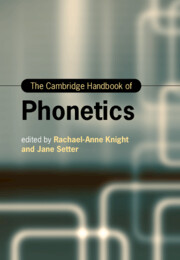Book contents
- The Cambridge Handbook of Phonetics
- Cambridge Handbooks in Language and Linguistics
- The Cambridge Handbook of Phonetics
- Copyright page
- Contents
- Figures
- Tables
- Contributors
- Introduction
- Section I Segmental Production
- Section II Prosodic Production
- Section III Measuring Speech
- Section IV Audition and Perception
- 16 Neurological Foundations of Phonetic Sciences
- 17 Psycholinguistic Aspects
- 18 Phonetics and Eye-Tracking
- 19 Automatic Speech Recognition by Machines
- Section V Applications of Phonetics
- Index
- References
18 - Phonetics and Eye-Tracking
from Section IV - Audition and Perception
Published online by Cambridge University Press: 11 November 2021
- The Cambridge Handbook of Phonetics
- Cambridge Handbooks in Language and Linguistics
- The Cambridge Handbook of Phonetics
- Copyright page
- Contents
- Figures
- Tables
- Contributors
- Introduction
- Section I Segmental Production
- Section II Prosodic Production
- Section III Measuring Speech
- Section IV Audition and Perception
- 16 Neurological Foundations of Phonetic Sciences
- 17 Psycholinguistic Aspects
- 18 Phonetics and Eye-Tracking
- 19 Automatic Speech Recognition by Machines
- Section V Applications of Phonetics
- Index
- References
Summary
Eye-tracking has proven to be a fruitful method to investigate how listeners process spoken language in real time. This chapter highlights the contribution of eye-tracking to our understanding of various classical issues in phonetics about the uptake of segmental and suprasegmental information during speech processing, as well as the role of gaze during speech perception. The review introduces the visual-world paradigm and shows how variations of this paradigm can be used to investigate the timing of cue uptake, how speech processing is influenced by phonetic context, how word recognition is affected by connected-speech processes, the use of word-level prosody such as lexical stress, and the role of intonation for reference resolution and sentence comprehension. Importantly, since the eye-tracking record is continuous, it allows us to distinguish early perceptual processes from post-perceptual processes. The chapter also provides a brief note on the most important issues to be considered in teaching and using eye-tracking, including comments on data processing, data analysis and interpretation, as well as suggestions for how to implement eye-tracking experiments.
Keywords
- Type
- Chapter
- Information
- The Cambridge Handbook of Phonetics , pp. 457 - 479Publisher: Cambridge University PressPrint publication year: 2021

